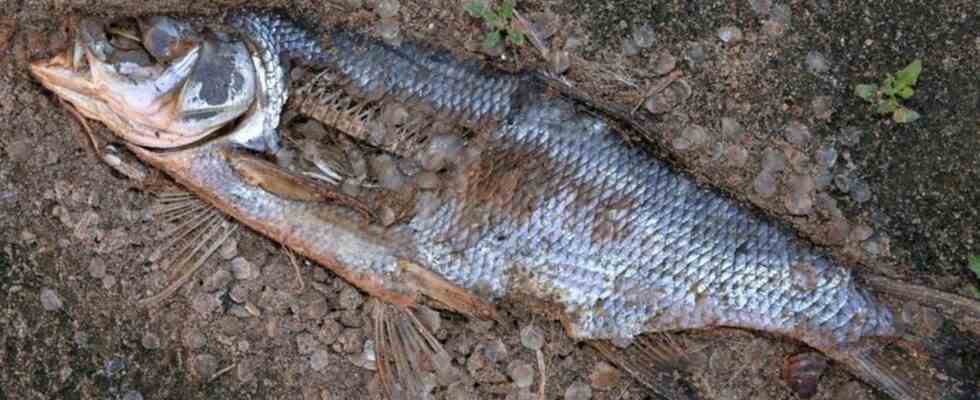environmental disaster
Fish kills on a gigantic scale
A dead fish on the banks of the Oder in Lebus. photo
© Patrick Pleul/dpa
Politicians, institutes and associations are looking for answers after the environmental catastrophe in the Oder. The environmental committee of the Brandenburg state parliament is, among other things, about the extent of the disaster.
According to Brandenburg’s Environment Minister Axel Vogel (Greens), the fish kill in the Oder has reached historic proportions. “A fish kill like we’ve never had – at least since 1989 – on a gigantic scale,” said Vogel at a special session of the environment committee in the state parliament.
According to estimates by the Institute for Inland Fisheries, between 25 and 50 percent of the fish have been killed. The losses of the fisheries on the Oder are drastic. According to the head of the Lower Oder Valley National Park, measures must now be taken to strengthen the resilience of the Oder.
In the incinerator of the PCK Schwedt refinery alone, 22 tons of fish carcasses have already been disposed of, and a further 88 tons have been registered there for destruction, the Environment Minister reported, “and many tons of dead fish have not even been recorded”.
“When fish are dying, you don’t find every dead fish”
The scientific director of the Institute for Inland Fisheries (IfB), Uwe Brämick, assumes that 200 to 400 tons of fish were killed. “When fish are dying, you don’t find every dead fish. We have to assume that two to four times as many fish died as were salvaged and disposed of.”
He described the losses of the fisheries on the Oder as drastic. “We assume that it will take two to four years before the potential of the stocks has developed again as it was before this development.” According to him, around 50 to 60 tons of fish are normally caught in the Oder by the 12 fishing companies, which earn 80 percent of their income from this. Anglers take just as many tons out of the river every year.
Brämick spoke out in favor of longer-term monitoring of the use of fish stocks. In this way, the consequences of such events could be better assessed and evaluated.
“We need a cure for the Oder”
According to the head of the Lower Oder Valley National Park, Dirk Treichel, the resilience of the Oder’s watercourse system must be strengthened. “We need a cure for the Oder,” said Treichel at the environmental committee. Everything must be done to minimize the stress on the ecosystem. This included the prevention of water discharges and water engineering measures.
In connection with the fish kill, Poland’s water authority claims to have discovered 282 sewage discharges without a current water permit. It is currently being clarified from where these lines to the Oder were laid and who they belong to, said the designated new head of the water authority, Krzysztof Wos, on Tuesday.

